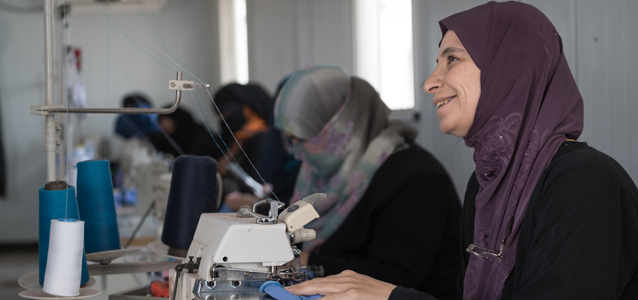Enhancing Syrian Women’s Empowerment in Camp Settings

Period: 1 January 2015- 31 March 2016
Donor: Government of Japan
Budget: $720,000
Project Goal: Syrian women affected by the Syrian crisis empowered through increased access to recovery opportunities
Within the framework of the Jordan Response Plan to the Syria Crisis 2016-18, UN Women operates three safe spaces for Syrian women in Za’atari refugee camp – two of which are funded through this Government of Japan supported project. UN Women has been operating in Za’atari camp since early 2013 and in these settings provides a range of services. Through its safe spaces incentive based volunteering opportunities –through a cash for work modality – are provided to 172 Syrian refugees, primarily women. This is supplemented with life skills support – literacy (English and Arabic), computer classes and awareness raising sessions on breastfeeding, domestic violence, early marriage & parental counseling. This is complemented by a protection referral service to provide high quality and immediate protection response to those in need. While economic empowerment is a key mitigation tool for addressing protection risks and vulnerabilities, UN Women’s experience in Za’atari has been that women come forward to report SGBV-related protection threats and concerns when approaching UN Women for other services – in particular cash for work. To further its reach, UN Women supports a voluntary protection network that serves as an outreach mechanism between UN Women services and the refugee population. The network receives series from ARDD-Legal Aid on ‘Do No Harm’ principles and communication techniques. This work is supported by a new initiative taking place under UN Women’s ‘He for She’ campaign. Through work supported by ARDD-Legal Aid, UN Women will be undertaking a series of sessions with men in the camp, looking at issues of camp stressors, stress management and SGBV.
The centers also serve as a safe convening space for partners seeking to reach out to women in the camp, with partner such as the United Nations Refugee Agency,the United Nations Children’s Agency, Bright Futures, Save the Children and others using the space to discuss key protection and basic needs issues. In its oldest Oasis UN Women shares the space with the United Nations Population Fund, building on the synergies of both organizations.
Providing a safe space for women to meet, and providing an incentive for them to do so – either through cash for work or other services – is an essential mechanisms for breaking the isolation of camp life and promoting dignity and self-worth.
UN Women has established a small medical fund in support of the refugees working across UN Women’s three Oases. The medical fund is replenished through the profit made through the work of refugees across the three Oases – e.g. profit made from visiting delegations. The medical fund is managed in cooperation withOperation Mercy, where by cases are approved for support by a committee led by refugees – once it has been ascertained that support cannot be provided in the camp or by other camp providers, and referred to Operation Mercy to facilitate the medical support needed.
To support women’s leadership and civic engagement, UN Women facilitates a 22 member women’s committee that serves as an interlocutor between Government of Jordan decision makers and camp residents. This both promotes the notion of women as leaders and representatives, and helps to support the development of a cadre of women leaders in Za’atari camp.